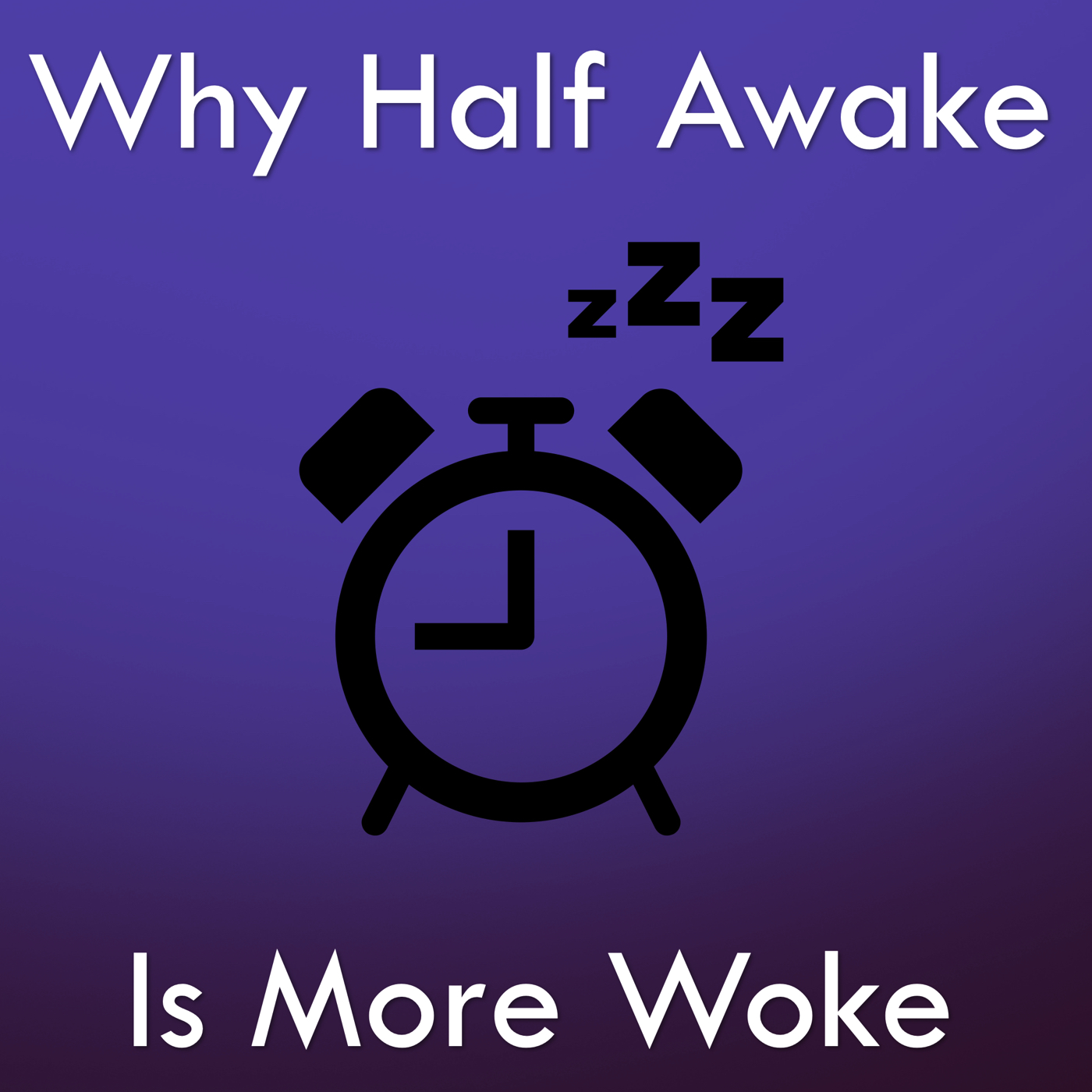What does it mean to be woke? Today, I’m going to argue that a person is more woke if they are half awake. Ready?

Let’s start with the first question. What does it mean to be woke? This will depend on who you ask. Thanks to politics, one answer might be that it is everything that the Democratic Party stands for. For a lot of people, it simply means being an activist in the Democratic Party or agreeing with Democrats on issues like abortion and same sex marriage.
Another answer might point to the origins of the term, but that’s harder to pinpoint. Who was the first to use it? I’m not talking about a play by Barry Beckham in 1971, nor to something earlier, like to an article in the New York Times in 1962. I’m talking about the general sense of it. I think we’d catch its spirit in the word “enlightenment.” The “enlightenment period” was a time when historical institutions, like Christianity, were challenged by science and secularism. Kingdoms were toppled by revolutionaries for the sake of rule by the people – as they embraced new concepts of ethics and morality that replaced church authority, such as Kantianism. Then as the enlightenment continued, Kantianism was partially superceded by existentialism and nihilism – the new “wokeness” of the day, much of which continues to predominate. Wokeness evolves. It isn’t today what it was back then.
Since it evolves, the origin of an idea doesn’t tell us much about its meaning. One aspect of what we call “wokeness” is education. How many are aware … how many have been awokened … to the Indian hijra, for instance? Well, in case you don’t know, for centuries, hijras were accepted in Indian royal courts as non-binary citizens. Hijras were neither male nor female. Perhaps they were some mixture between them, or otherwise undefined. It way predates the American LBGQT movement.
Hijras were only oppressed as a class when Britain came to rule and introduced laws discriminating against them based on the Brittish empire’s own mostly Christian cultural norms. India’s anti-hijra laws have been challenged by a minority of more sensitive and daring citizens for many years – but only most recently, largely thanks to LBGQT activism, has there been enough impetus to change them. Hijras have a hard time working and surviving. Suicide rates are very high among them.
To be woke is to be aware of this sort of oppression and injustice, even in another country, and to understand one’s obligation to do something about it. Wokeness is being alert. The most woke are the most aware of injustice. The educated, especially the liberally educated, are the elites of the awoken in a great and ever-evolving awakening. Make sense? Perhaps this explains why so many University professors lean extremely far to the left.
Whatever its extremes, to be woke just basically means being aware of the human condition and its need for deliverance from systemic oppression and for social justice. Do police discriminate against African Americans? 90% of black Americans think so, but only 35% of white Americans think so. To be “woke” is to recognize that systemic injustice against black Americans is a reality that needs to be overcome.
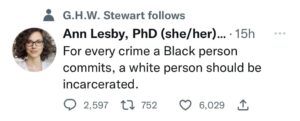
Now for those who believe that legal and other systemic biases against black Americans is exagerated or untrue, let’s do a thought experiment. Imagine for a moment that such systemic oppression does exist and that it is far worse than you thought. What would be the right way to measure it? At what point would justice be satisfied?
What are the KPIs? … the Key Performance Indeces? Would equality be enough? Or would recompense be involved? If so, how much and in what form? Should whites, who are comparatively privileged on average, pay for crimes against humanity in order to achieve justice? Some people think so. Others think its unfair to pay for crimes they didn’t personally commit. Full wokeness tends to extremes. It can never be satisfied that justice has been served. Half wokeness is more alert than full wokeness because it pays attention to complex sets of diverse view points and feelings, seeking to include everyone in win-win policies.
Another reason half awake is better than being woke is revolution. Revolution sucks. Let me paint a detailed example. Let’s say you have a specific vision for change and that you’ve decided on a KPI. For instance, let’s say you’d be satisfied that women are no longer being systematically discriminated against in the market place once the average pay for women is equal to the average pay for men. That’s your KPI. It seems reasonable and good so you embrace it. Until there is equal average pay, you will insist that women are treated unfairly in the work place. Sound about right?

But now lets consider the future. Suppose you are unable to achieve your KPI despite decades of efforts. Suppose that you ban together with some other women, and maybe some men, who feel the same way and you all form a political movement that promises an end to this injustice once and for all. The devil is in the details. Let’s further suppose that in its ranks, there are some who start burning down buildings to better get your message across. These few radicals in the midst reason that if their message hasn’t been heard with all those prior efforts, it never will be, so they force some media attention on it by destroying property.
This is what often happens with political movements. And it gets worse. It’s not hard to imagine that finally one day in a wave of momentum, your women’s advocacy group protests at the US Capitol building. That day, someone breaks in, many protesters are jailed, someone gets hurt, and anyone associated with the group is subsequently put on a terrorist watch list, even though they were almost all just peaceful protesters and you personally never met one single violent person or advocate of violence. In the end, many innocent bystanders, such as yourself, are put in jail and held without trial for years while the movement itself is marginalized as radical, setting it back for decades to come. You are left bewildered. You will wonder whether your political opponents planted people in your midst just to ruin your efforts.
Now if you were half awake, rather than fully woke, you might have been more careful about how you went about achieving change. You might have weighed out the costs and benefits, and the risks, before taking action. In fact, having done so, you might see that to be half awake this way, would have entailed a deeper consideration of your action. And in the final analysis, in as much as wokeness is awareness and consideration, being half awake would mean being more woke.
Maybe it’s the inherent downside of package deals we should be more woke to. Political movements tend to be package deals.
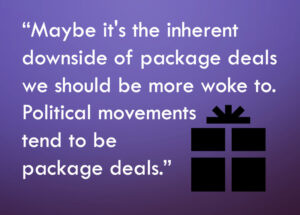
Let’s take another example – Karl Marx. Marx and Engels made some fair observations about the systemically oppressive nature of capitalism. They predicted correctly that a worker class would eventually rise up against the ownership class because business owners would exploit them increasingly over time as competition rose in the industrial age, alienating them from their work. For Marx and Engels, the Key Performance Index that would signal the end of this injustice was the ownership of the means of production by the working class. The less they got back from their work, the more meaningless their work would seem and the only way to fix that fundamental problem, would be if the workers rose up and seized the means of production and abolished ownership. Keep in mind that Marx wasn’t necessarily advocating revolution. He was predicting it, knowing human nature. There’s a difference. And then in 1917, the Bolshevik revolution fulfilled his prophecy. It ended the Russian monarchy. And it was very bloody. In fact, the Communist revolutions in the Soviet Union and its satelites and later in China, made the twentieth century by far the deadliest century in human history. Hundreds of millions were killed.
And to what end? The Soviets are no longer Communists. Their economy failed. The Chinese thrive today as a superpower rivaling the United States not because of Communism, even though the Chinese Communist Party remains in power to this day, but because in the 1970s, 80s and 90s, the Chinese Communist Party leader Deng Xiaoping, concluded that Communism would ultimately be successful only if it was first allowed to flourish economically through free market capitalism. It just couldn’t work in a primarily agricultural economy. His successors amplified this policy with still more economic reforms and even some government stimulus packages – putting the West to shame. This opened the door for Chinese technological dominance today under the leadership of the Dictator for Life, President Xi Jinping. Chinas is far ahead of the United States on AI and they have the fastest growing economy in the world.
So, does this mean that Communism is dead forever? Let’s think about this. The success of free market capitalism in China today leads many in the West to believe that China is no longer a communist country. Westerners lift up Chinese free market policies as proof that capitalism is superior to communism and socialism. But can we be certain of this? Read Sun Tzu’s The Art of War. No Chinese leader has failed to read this. It’s like the Bible to them. Sun Tzu teaches leaders to fool enemies into misjudging them, to completely misunderstand them, and then to capture them by surprise. No one in the West expects a sudden turn-around in China back to Communism, given what it sees. But have we misjudged China?
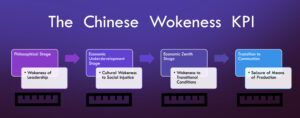
There is more to this than military strategy. There is the fact that the Chinese value science above theory. They observed the failure of Communism as it attempted to impose itself on a peasant economy in twentieth century Russia. Their own economy was characterized by a peasant class so the best they could offer, in the days of Chairman Mao was an anti-Western cultural revolution. Chinese economists observed through experimentation that an agricultural economy was an inadequate stage of economic progress for a successful Communist revolution. Chinese Communist Party economic theorists since Deng Xioping still believe that the best time to convert their economic system is when Capitalism has reached its zenith in a highly industrial age, and even with a dominant tech sector, its population is still primarily rural. Even so, worker dissatisfaction is a key component in the theory’s mix. The disintegration of the middle class is essential, and that indeed is taking place. If the working class is driven to misery, while a few own vast amounts of property and business capital, only then will there be widespread support for a successful revolution. And in fact, this is what many are predicting today as AI and automation point to high unemployment and lower wages in the very near future.
The Chinese revolution, which I say may be forthcoming, also has a third key component – transition. If you were about to take over a business, would you prefer a tiny business, or a giant one? If you are going to have a revolution that involves seizing the means of production, how much production are we talking about? Hopefully, plenty. This is why it behooves Chinese Communist revolutionaries to let free market capitalism take its course and flourish. There will be more to seize.
To understand how this works, it’s important to understand what Communism actually is. It isn’t socialism. Socialism is just capitalism that is run by the state – usually very inefficiently. Private enterprise might be usurped by the government, but then the government owns and runs each enterprise, generally not understanding much about the businesses it then runs. Furthermore, the economy still involves trade, currency and ownership. When the state owns the means of production and puts everyone on welfare, it winds up rationing its net gains to its population. The gains tend to be smaller than they would be in a decentralized free market because government bureaucrats are horrible at running businesses. So, if we suppose that some socialist experiments have succeeded, as some have in certain ways, we still have to anticipate and contend with these inherent pitfalls.
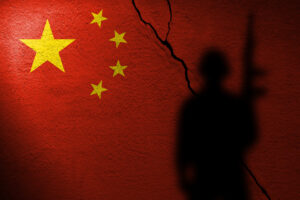
Communism is quite different. Communism abolishes ownership entirely. If there is no such thing as ownership, there can be no such thing as trade. There are pros and cons to tradeless economies. On the plus side, everything is free. On the minus side, everything is rationed. On the plus side, equality is achieved. On the minus side, all share equally in misery. This is why a successful transition to Communism requires the type of flourishing economy China now enjoys, at least in some sectors. In the transition to Communism, there will be both a high level of general dissatisfaction with inequality, (enough to foment a successful revolution), and a great deal of production to enjoy. Production yields abundance for everyone rather than misery for everyone – (hypothetically speaking anyway). I suspect this line of thinking has motivated the past several CCP leaders to embrace free market capitalism – not capitalism for the sake of capitalism, as if capitalism had won and communism had been forever defeated. I think these people are more than Communists in name only. They are the real deal.
Give me the benefit of the doubt on this. Suppose I’m right. What happens then? What would CCP “wokeness” mean?
I think it could mean a number of things. It might entail global domination, or maybe not. If it lacks enough resources to flourish on its own, military aggression might be on its agenda. If that’s the case, then a revolution will mean World War III. Remember what I said, this is a political movement. There might be some who prefer a global communist revolution in the party. Xi could be one of them – or maybe his assassin. But Xi is not stupid.
Let’s assume Chinese leaders would prefer to avoid picking up the pieces from an exceedingly destructive war and that they suppose their country is exceptionally large enough to have a closed economy – an autarchy. Let’s think more positively and suppose that’s the road it would most likely take. This leaves China on its own, (with or without possession of Taiwan and Hong Kong). Woke Communism supposes that love for the state is a sufficient incentive to work to produce and distribute the goods and services its current economy presently provides in exchange for money. Woke Communism is naive for thinkng this. A tradeless economy is called an asynalagonomy. Love for the state is an insufficient motivator for maintaining and increasing economic output, with or without the help of automation. If the CCP wants its population to continue in abundant production of goods and services, an effective system of incentives is required. Coercion would cause discontent and uprisings. Positive incentives would be required. But without ownership, and in a population that values equality, what positive incentives could there be? You can’t give anything to anyone, since they can’t own it. And nobody can have anything anyone else doesn’t also have.
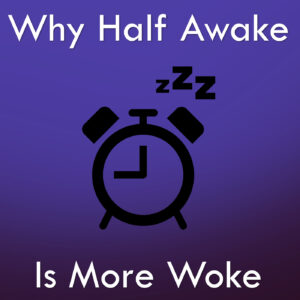
The result is that Chinese wokeness is too woke. It needs to dream a little deeper and find a win-win when it comes to incentives. It has to abandon a certain fixed ideology it has long embraced – and replace it with a better, more realistic, vision. It needs to make an adjustment for a pivotal flaw and wake up to a more nuanced plan.
What it needs to do is embrace the HAND System. The HAND System is a tradeless economy managed by a massive online catalog where all goods and services found in any presently operating free market business, can be found and obtained. When the means of production are taken over by the government, workers are asked to go back to work, enter their products and services into the catalog, and meet demand. With the web site built in advance of this bloodless revolution, the transition will run smoothly – so long as sufficient incentives are put in place. Fortunately, the HAND System is not just an asynalagonomy. It is an incentivized asynalagonomy.
An incentivized asynalagonomy involves two features that woke Communism might consider anathema – privilege and inequality. Be half awake with me on this for a moment and bare with me. First off, I don’t just mean any old privilege. I mean earned privilege, and I mean earned inequality. What is earned privilege? you ask. What is earned inequality?
Let’s first talk about ownership. When a nation has made trade illegal, ownership is reduced to either illegal trade in a black market, or to personal possession of property. In any sort of economic system, the ability to have something in your possession without the fear of someone having the right to take it away from you without your consent is one of the intrinsic benefits of ownership. This is called security. The ability to trade it is another matter. One of the failures of Communism in Russia was black market trade. I’ll talk about black market trade in another episode. Right now, I want to focus on the sense of security that can be gained from having the right to possess something. Ownership in an incentivized asynalagonomy stems from earned privilege. In an incentivized asynalagonomy, earned privilege involves what a person can own and possess if they choose to do so, but it is illegal to trade what one owns. And the reason it is illegal is for the protection of another feature of privilege – earned inequality.
Inequality is important. I know this sounds strange. Social status and economic class, as well as privilege, are often viewed negatively by the woke. They are considered part of the problem, but in an incentivized asynalagonomy inequality is a motivator. And besides, in the system I’m proposing, equality is achieved sytemically through equal opportunity on a level playing field that has no history of oppression that it would need to compensate for. Furthermore, not only do all begin with the same advantages, but opportunity continues to exist equally at all times. The system doesn’t change. Everyone has the same opportunity to gain and maintain privilege as everyone else – be they male, female, otherwise identified, and regardless of race, creed, age, sexual preference, and maybe even national origin. I picture here a very kind and forgiving Chinese leadership.
Incentivized inequality means that class privilege and its associated rights to ownership can be earned through work. When the worker goes back to their old job after the transition, there will be a privilege value associated with that work. Let’s say privilege levels can vary on a scale from 1-100. Not all types of work are of the same value to other people and some classes of business won’t be needed at all. Those in the business of advertising and accounting and finance, for example, would all have to look for new jobs because there would be no more advertisements or concern for profits or any such thing as expenses or balance sheets in an incentivized asynalagonomy. If that sounds like a bad thing, don’t worry. Those in need of learning new skills would enter trade schools and earn privilege for learning high demand trades while in school. Demand would be determined by the number of requests on the online catalog known as the Human Availability and Needs Database System – HANDS. To purchase an item from the catalog, a person would need a sufficient privilege level for that item. So if the item was listed at a privlege level of fifty, but you only had forty nine, you could not obtain that item. You would have to earn a higher privilege level first.
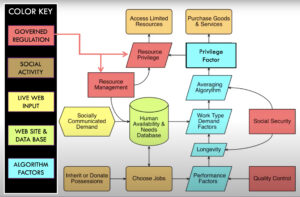
Demand would determine privilege level in real time and would be balanced by the limits of resources. Limited resources would be protected by resource managers. Replenishable resources would be produced according to demand and there would also be laws prohibiting the destruction of the environment to protect against pollution and climate change, but those laws would not be in conflict with shareholders of enterprises, (because there wouldn’t be any), though some workers might retrain as students in the free trade schools when they discover their old jobs aren’t in demand. Demand alone would not determine fair inequality though. Those ordering through the catalog would also debate and vote to boost or lower the privilege level of various categories of work, as they see fit. The election system would also be tied in to one all encompassing catalog.
It is precisely this sort of inequality that would ensure that each person worked. And if each person worked, there would always be an abundance of goods and services available. Whereas, if we relied on love for the state to sustain us, and each person possessed the same rations, scarcity would quickly result. Unfortunately, most people are unwilling to work simply because they love their country or they believe in doing their fair share. It is very naive (and unwoke actually), to believe that people will work at all, much less do a great job, simply because they love their country. A half woke approach is alert to this fact. And the system would include job auditing to ensure quality, providing demerits for poor quality work that lowered privilege, and merits for high quality work that raised privilege levels.
There are many facts a half woke approach is alert to. We are alert to the fact that revolution means killing, incarceration, and great tragedy. We are alert to the fact that it may mean irresponsible risks, huge setbacks and maybe even utter defeat. We are alert to the fact that a vision of the ends that we suppose might justify the means may actually be an illusion, a deceptive mirage that leads us only to loss and destruction.
Now many of you might suppose you are also alert to some of the inherent weaknesses in the HAND System, which I just proposed. You may disagree that the Chinese will ever turn back to Communism, as well. And you may be right. As for the weaknesses in the HAND System, I’ve addressed many of them elsewhere and offered proposals for various adjustments accordingly. You’ll find this information on the JamesCarvin.com web site. Look up the Frequently Asked Questions under asynalagonomy. As for the Chinese, this was just an illustration. Revolution is not a pretty thing. Without a system of incentives, what we are left with is a system of coercion. We are left with gulags and work camps. It wouldn’t really matter whether the Chinese took control by force. They could only exercise a woke form of Communism through coercion. If they don’t transition, they will be left with an ever-widening gap between rich and poor, leaving the poor quite destitute. If they do transition, they will have a dystopia. They are in a lose lose situation if they don’t consider my more half-woke solution.
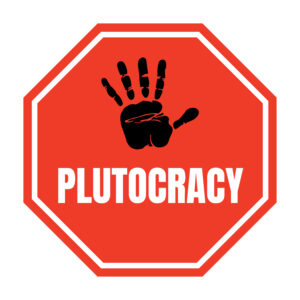
But forget the Chinese. What I’m saying pertains to the West. We also are experiencing this same ever-widening gap between rich and poor. Now in my opinion, the rich becoming richer wouldn’t be a problem if it weren’t for their unfair influence over our elected officials. The poor becoming poorer, on the other hand, involves direct, daily suffering and stress. You don’t have to have class envy to suffer from poverty. Personally, I see a very bleak economic future ahead both in the West and East. We have unsustainable debt at this point. We have problems, many of them systemic, that our current system is failing to solve. Sooner or later we are going to realize that the only solution will be to reset the entire economy – globally. We can choose between revolution, or a tweaking of our dream – to something not so woke, which is actually quite a bit more alert.
Now let me say some astonishing things. Personally, I believe the HAND System is capable of ending poverty altogether once and for all if it is adopted on a global scale. If it was, it would provide universal healthcare that is free. Education would be free, as well. There would be no debt. No one would ever lose their home. There would be no homelessness. The HAND System would prioritize sustainability and end the climate change crisis without harming any industry. It would also dramtically reduce crime. I would love to share with you why this is all true. But I will state up front that despite all these benefits, I see the HAND System as too visionary to be a relevant solution for our age. Pamalonomies, by contrast, are well suited to our current condition and mindset. So as we finish out Season One of this Blogcast, we’re going to direct our focus onto Pamalonomies. Then in Season Two, you can expect to hear a whole lot more about them. So in our next episode, we’ll return to the subject of pamalonomies.
Pamalonomies? In case you missed it, a pamalonomy is a high impact concept stage enterprise either for profit and owned by service providers and users, or non profit and assisted by Pamalogy Society volunteers. The Pamalogy Society teaches Pamalogy and funds pamalonomies while helping with staff. This is our mission. Please help by supporting us on Patreon. Volunteer support is also welcome, as well. Just send a message and we’ll put you to work. Ciao!
URL for sharing this transcript page: https://pamalogy.com/2022/11/23/why-half-awake-is-more-woke/
URL for sharing this podcast: https://player.captivate.fm/episode/267e42d2-7c77-4bdb-b7c3-9a8bac1f997d
URL for sharing just the audio file: https://podcasts.captivate.fm/media/9fe70831-8cc9-4234-8620-bb8e1fbe55c1/Episode23-WhyHalfAwakeIsMoreWoke-converted.mp3
Previous: Pamalonomies in the Philosophy Pond
Up Next: The Pathway to Awesomeness

